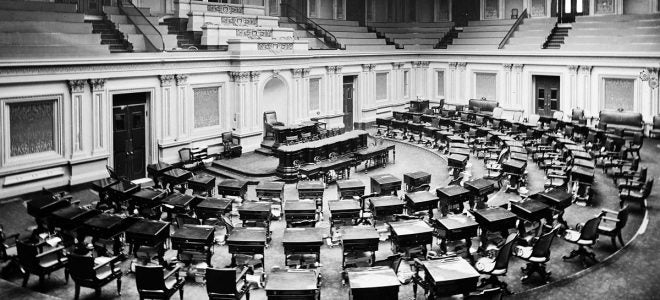

Scott Yenor is Professor of Political Science at Boise State University. He is the author of Family Politics: The Idea of Marriage in Modern Political Thought (Baylor 2011) and Hume’s Humanity: The Philosophy of Common Life and Its Limits (Palgrave 2016).
Scholars and partisans have worried about the “Imperial Presidency” since the early 1970s, when Arthur Schlesinger Jr. wrote a book about the out of control actions of Presidents Johnson and Nixon. Congress reacted with some steps to limit executive discretion. Yet those actions have not been overly effective and they have done little to stop the transfer of ever-greater power to the executive and the bureaucracy under his control. A change of institutions, in line with the thinking of the American Founders, would help to resolve this imbalance of power and make it easier for Congress to be a player in checking the executive branch.
President Obama especially has brought attention to an important defect in our constitutional system — the difficulty of congressional oversight over administrative rule-making. Important decisions are made in the bowels of our administrative state — in the Environmental Protection Agency, in the Civil Rights division of the Justice Department, in the regulation of our financial industries, in the regulation of housing and in countless other avenues — and are the result of very broad, (perhaps) irresponsible congressional delegations of power.
While other administrations have interpreted these rules to suit their policy goals, the Obama administration has set new records in taking advantage of the discretionary room that congress has delegated. Other presidents exercised self-restraint in how they interpreted congressional mandates, as they followed the broad intent of Congress. The Obama administration has, in some instances, effectively made laws that Congress would not pass (CO2 regulation) while deciding not to enforce some they had (immigration laws). It has accomplished through executive actions what might have been accomplished through treaties. It has not felt honor-bound to defend some of the nation’s laws in court, nor has it exercised that self-restraint that presidents would “take care that the laws would be faithfully executed.”
President Obama is not the first president to reveal the problem of presidents who do not want to follow the intent of Congress. President Andrew Johnson vetoed almost all the important Reconstruction legislation when he arose to the presidential office upon the assassination of Pres. Lincoln. After vetoing civil rights legislation, military reconstruction and the Freedman’s Bureau, Johnson was hardly assiduous in carrying out the policies of Congress. Through his foot dragging, he undermined any possibility that reconstruction could have been brought to a successful conclusion. Congress reacted to Johnson’s intransigence by limiting his power to remove the executive officials that were carrying out Congress’s intent. This was a desperate measure — one that has ever since been regretted by most of those in favor of executive independence. After limiting the removal power, Congress tried impeachment when Johnson did not obey that law. Congress had few other levers to get him to enforce the laws it had passed, and his presidency passed without a real attempt to secure the goals of Reconstruction while the iron was hot. It is one of the great tragedies of American history.
Today, President Obama poses all of the problems posed by Andrew Johnson 150 years ago, compounded by all of the problems of the administrative state.
The administrative state is part of the government where experts, armed with specialized knowledge, are to implement Congress’s general laws for the public good. Another word for it is bureaucracy. The problems of the administrative state are, however, manifold. The most important problem is that the civil servants and political appointees administering the bureaucracy have interests themselves, institutional and ideological interests. As they are given more discretionary power, they are allowed to pursue their agendas freed from public control and democratic accountability. When Pres. Obama has not been able to achieve legislative fixes he wants, he has often turned to the bureaucracy to give him what he is looking for within the hardly confining general interstices of legislation. At some point, this rule-making comes to resemble law-making, but it is law-making without legislative accountability.
This problem forces us to think about constitutional principles. The separation of powers system aimed to fortify the weaker branches of government against the encroachments and unchecked powers of the stronger branch. For the American Founders, the legislative branch was the one that “was drawing all power into its impetuous vortex,” as Madison writes in Federalist 48. Madison reiterates this same problem later in Federalist 51, where he reminds us that “the legislative power necessarily predominates” in a republican government. The great Virginian canvasses several reasons why the legislature would remain close to the people’s heart and it is a matter of no small interest to wonder why this is no longer the case.
The American Founders solved the problem of legislative dominance with a two-pronged approach. First, they divided and weakened the legislature into two houses. “The remedy” for the problem of legislative dominance, writes Madison in Federalist 51, “is to divide the legislature into different branches; and to render them, by different modes of election and different principles of action, as little connected with each other as the nature of their common functions and their common dependence on the society will admit.” Bicameralism weakens the legislature by making it much more difficult for the two bodies to get on the same page, to pass consistent laws, to have a consistent approach to executive-legislative relations.
The second part of the Founder’s strategy was to fortify the weaker branches by ensuring that each branch would, most importantly, have a “will of its own” by being selected independently of Congress, and also have the “constitutional means and the personal motives to resist the encroachments of the other branches.”
What Obama has shown is that the problem that the Founders sought to solve has been somewhat turned on its head. Legislative power no longer predominates. Congress has been abdicating its lawmaking powers, through the passage of general legislation, for well over a half a century, as political scientist Ted Lowi demonstrates in his 1969 classic The End of Liberalism. The roadmap that the Founders laid out for us provides a way forward. As the executive and administrative powers are “everywhere drawing all power into [their] impetuous vortex” and as the weaker branch has only “parchment” powers to resist the executive’s encroachments, perhaps it is time to strengthen Congress by replacing our bicameral legislature with a unicameral one. The problem of the administrative state calls for the elimination of the United States Senate.
Chris de Muth calls for the elimination of the filibuster to fortify Congress so it can get its act to re-introduce the administrative state to the separated system and the checks and controls. The de Muth proposal is a good first step, but it does not go far enough. Congress would still be a divided institution and not have sufficient powers to reign in the administrative state. No group in Congress was as united as the Radical Republicans in the immediate aftermath of the Civil War. They still could not solve the problem of Pres. Johnson’s unwillingness to enforce the laws with the letter and spirit that Congress demanded. The problem was easier then. A more radical basis for legislative unity is needed for a world itself new.
Several constitutional powers currently divided between the two houses of Congress could be made more effective were they to be united under one house. Consider impeachment powers, for instance. Perhaps a more robust understanding of executive accountability could be introduced by making the House solely responsible for impeaching and removing executives who have violated the law. I would suggest a lower standard (majority for impeachment and for removal) for “inferior offices” so that those actually charged with enforcing laws adhere to Congress’s will and a higher standard for executives at cabinet level and above (perhaps majority for impeachment; supermajority for removal). Advise and consent functions could be conducted in the House instead of the non-existent Senate.
Consider also lawmaking and budgeting. A one-branch legislature could much more surgically aim at violations of congressional mandates because it would not be overwhelmed with the problems of gaining congressional agreement from two branches.
The problem of the administrative state seems here to stay. If it is, we are well passed the time to apply the principles of the American Founders to a new situation. This calls for “radical measures,” as George Washington himself said on the eve of the Constitutional Convention. A re-application of our constitutional principles to post 19th Century developments in American politics may be the ticket.